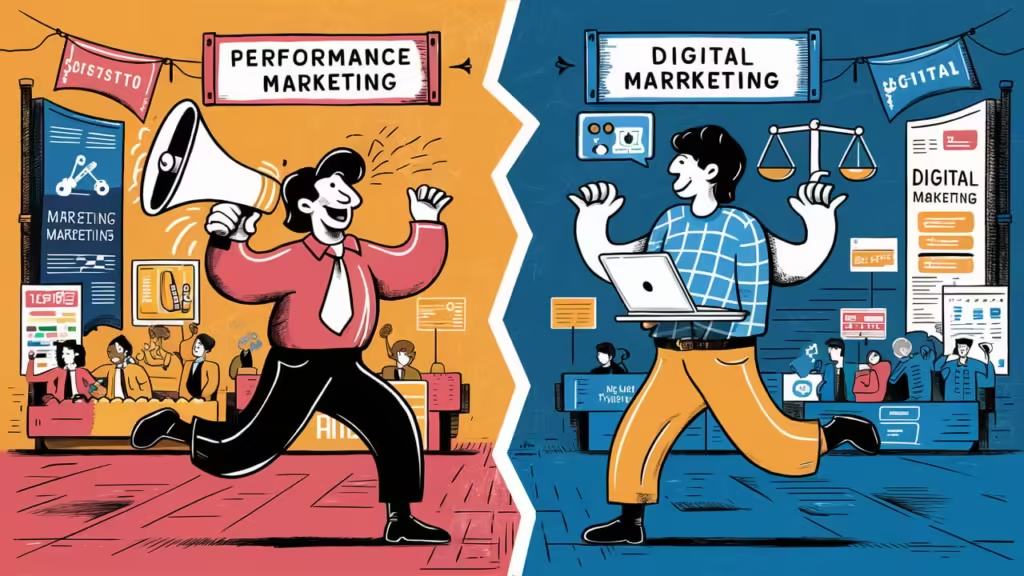Brands are setting the standard for marketing words and tactics in the current digital era. The two top terms “performance marketing” and “digital marketing” are often used interchangeably but the difference comes in the marketing approach of these terms.
Many companies are uncertain about the difference between these two strategies and are spending lots of money to grow their business.
In this post we will provide you a step by step guide to the definitions, components, benefits, and differences between these two terms to assist you in selecting the strategy that will work best for your company’s requirements.

What is Performance Marketing?
Performance marketing is a subset of digital marketing. Performance marketing is a targeted marketing strategy which focuses on measurable results and Return on Investment (ROI).
This focuses on result oriented outcomes like sales, leads, or app downloads.
To measure and optimize campaigns for maximum output KPIs (Key performance indicators) are used.
Basic Components of Performance Marketing
– Cost Per Click (CPC): In this the advertisers pay for every click on the ad.
– Cost Per Acquisition (CPA): ln this the advertisers pay only for some specific actions like download, sign up or sale.
– Cost Per Thousand Impressions (CPM): In this the advertisers pay for every thousand impressions of their ad.
– Affiliate Marketing: One of the leading steps in this field. It includes collaboration with affiliate marketers for product advertisement.
What is Digital Marketing?
Digital marketing focuses on online marketing strategies. The aik of digital marketing is to promote brand awareness, generating leads, selling products, driving traffic to websites, etc.
Digital Marketing operates within a diverse ecosystem of channels, each catering to specific aspects of a comprehensive marketing strategy.
Basic Components of Digital Marketing
– Search Engine Optimization (SEO): Enhancing website visibility on search engines.
– Content Marketing: Creating valuable content to attract and engage an audience.
– Social Media Marketing: Promoting products or services through social media platforms.
– Pay-Per-Click (PPC) Advertising: Paying for ad clicks to drive traffic to websites.
– Email Marketing: Sending targeted emails to nurture leads and customers.
– Affiliate Marketing: Partnering with other businesses to earn commissions on referred sales.
Key Differences Between Performance Marketing and Digital Marketing
| Feature | Performance Marketing | Digital Marketing |
| Focus | Measurable results and ROI | Brand awareness, lead generation, traffic |
| Channels | Paid search, social media advertising, affiliate marketing, email marketing | SEO, content marketing, social media, email marketing, PR |
| Measurement | KPIs (conversions, ROI, CPA) | Website traffic, engagement, brand mentions |
| Goal | Driving specific actions | Building brand awareness and customer relationships |
Performance Marketing vs Digital Marketing: A Comparative Table
| Feature | Performance Marketing | Digital Marketing |
| Examples | Pay-per-click (PPC) advertising, affiliate marketing, influencer marketing | SEO, content marketing, social media posting, email newsletters |
| Suitable for | Businesses looking for immediate ROI, measurable results | Businesses building brand awareness, long-term customer relationships |
| Timeframe | Short-term (campaigns, promotions) | Long-term (brand building, customer loyalty) |
Benefits of Performance Marketing
1. Risk Mitigation: Pay only for actual performance and results.
2. High ROI: Focuses on measurable outcomes leading to better ROI.
3. Transparency: Clear metrics and KPIs for performance evaluation.
4. Flexibility: Campaigns can be easily adjusted based on performance.
5. Scalability: Easy to scale successful campaigns for better results.
Benefits of Digital Marketing
1. Wide Reach: Ability to reach a global audience.
2. Cost-Effective: Often more affordable than traditional marketing.
3. Measurable Results: Easy to track and measure campaigns.
4. Targeted Advertising: Ability to target specific demographics and interests.
5. Brand Building: Enhances overall brand visibility and authority.
Choosing the Right Strategy for Your Business
Choosing between digital marketing and performance marketing depends on your business goals, budget, and target audience. If your aim is to build brand awareness and engage with a broad audience, digital marketing might be the way to go. On the other hand, if you seek measurable results and a higher ROI, performance marketing could be more suitable.
Conclusion
Both performance marketing and digital marketing play vital roles in a comprehensive online marketing strategy. Understanding their differences and benefits can help you create a balanced approach that leverages the strengths of both strategies. By integrating these methods, businesses can enhance their online presence, drive targeted traffic, and achieve measurable results.
Remember: A successful marketing strategy often involves a combination of both performance and digital marketing tactics.
FAQs
What’s the difference between performance marketing and digital marketing?
Is performance marketing a SEO?
What is an example of performance marketing?
What are the different types of performance marketing?


